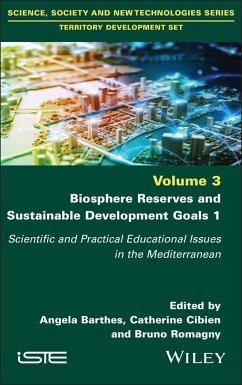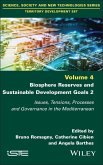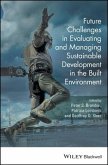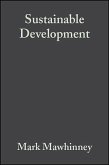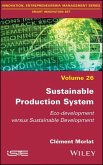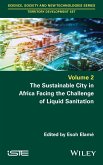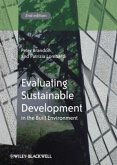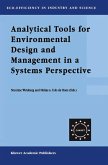Biosphere Reserves and Sustainable Development Goals 1
Scientific and Practical Educational Issues in the Mediterranean
Herausgeber: Barthes, Angela; Romagny, Bruno; Cibien, Catherine
Biosphere Reserves and Sustainable Development Goals 1
Scientific and Practical Educational Issues in the Mediterranean
Herausgeber: Barthes, Angela; Romagny, Bruno; Cibien, Catherine
- Gebundenes Buch
- Merkliste
- Auf die Merkliste
- Bewerten Bewerten
- Teilen
- Produkt teilen
- Produkterinnerung
- Produkterinnerung
Since 1971, UNESCO's Man and the Biosphere (MAB) Programme has embraced a number of principles that link the political, scientific and academic spheres. Biosphere Reserves and Sustainable Development Goals 1 presents these areas as privileged spaces for experimenting with operating methods specific to cross-cutting objectives and issues. These areas encourage the development of interdisciplinary research, supported by a worldwide network to disseminate experience, approaches and knowhow. The various global and local political scales are linked here, with different consequences for the…mehr
![Biosphere Reserves and Sustainable Development Goals 2 Biosphere Reserves and Sustainable Development Goals 2]() Biosphere Reserves and Sustainable Development Goals 2179,99 €
Biosphere Reserves and Sustainable Development Goals 2179,99 €![Future Challenges in Evaluating and Managing Sustainable Development in the Built Environment Future Challenges in Evaluating and Managing Sustainable Development in the Built Environment]() Future Challenges in Evaluating and Managing Sustainable Development in the Built Environment179,99 €
Future Challenges in Evaluating and Managing Sustainable Development in the Built Environment179,99 €![Sustainable Development Sustainable Development]() Mark MawhinneySustainable Development138,99 €
Mark MawhinneySustainable Development138,99 €![Sustainable Production System Sustainable Production System]() Clément MorlatSustainable Production System194,99 €
Clément MorlatSustainable Production System194,99 €![The Sustainable City in Africa Facing the Challenge of Liquid Sanitation The Sustainable City in Africa Facing the Challenge of Liquid Sanitation]() The Sustainable City in Africa Facing the Challenge of Liquid Sanitation179,99 €
The Sustainable City in Africa Facing the Challenge of Liquid Sanitation179,99 €![Evaluating Sustainable Development in the Built Environment Evaluating Sustainable Development in the Built Environment]() Peter BrandonEvaluating Sustainable Development in the Built Environment113,99 €
Peter BrandonEvaluating Sustainable Development in the Built Environment113,99 €![Analytical Tools for Environmental Design and Management in a Systems Perspective Analytical Tools for Environmental Design and Management in a Systems Perspective]() WrisbergAnalytical Tools for Environmental Design and Management in a Systems Perspective126,99 €
WrisbergAnalytical Tools for Environmental Design and Management in a Systems Perspective126,99 €-
-
-
Hinweis: Dieser Artikel kann nur an eine deutsche Lieferadresse ausgeliefert werden.
- Produktdetails
- Verlag: Wiley
- Seitenzahl: 256
- Erscheinungstermin: 26. März 2024
- Englisch
- Abmessung: 234mm x 156mm x 16mm
- Gewicht: 535g
- ISBN-13: 9781786307804
- ISBN-10: 1786307804
- Artikelnr.: 69923996
- Herstellerkennzeichnung
- Libri GmbH
- Europaallee 1
- 36244 Bad Hersfeld
- 06621 890
- Verlag: Wiley
- Seitenzahl: 256
- Erscheinungstermin: 26. März 2024
- Englisch
- Abmessung: 234mm x 156mm x 16mm
- Gewicht: 535g
- ISBN-13: 9781786307804
- ISBN-10: 1786307804
- Artikelnr.: 69923996
- Herstellerkennzeichnung
- Libri GmbH
- Europaallee 1
- 36244 Bad Hersfeld
- 06621 890
Introduction xxi
Angela BARTHES, Catherine CIBIEN and Bruno ROMAGNY
Part 1 Biosphere Reserves and Sustainable Development Goals:
Multidisciplinary Scientific Issues
Introduction to Part 1 3
Bruno ROMAGNY
Chapter 1 Man and the Biosphere: A Precursory Program for the Next World 7
Meriem BOUAMRANE and Didier BABIN
1.1 1971-2021, the beginnings of sustainable development 7
1.2 Making sure no one is left behind 9
1.3 Identification of gaps, risks and challenges 10
1.4 Valuable lessons learned from the transformation towards sustainable
and resilient societies 11
1.5 Investments that may affect the building of sustainable and resilient
societies 11
1.6 Integration of biodiversity within sustainable development policies 12
1.7 Policy recommendations to accelerate progress in building sustainable
and resilient societies 13
1.8 Lessons learned from the Covid-19 crisis and perspectives for biosphere
reserves for the next world 14
1.9 References 15
Chapter 2 Humans and Nature: A Story to be Rewritten 17
Magda BOU DAGHER KHARRAT, Éliane BOU DAGHER and Rhéa KAHALÉ
2.1 Homo sapiens, a species like the others 17
2.2 Homo sapiens, a nature modifier 17
2.3 The Mediterranean, more than a sea in the middle of the land 19
2.4 The academic sphere and the action in favor of biodiversity 20
2.5 Biosphere reserves and Sustainable Development Goals 21
2.6 References 23
Chapter 3 Social Representations, Collective Organization and Mediterranean
Biosphere Reserves 25
Angela BARTHES, Bruno ROMAGNY, Jean-Marc LANGE, Lahoucine AMZIL, Roser
MANEJA, Mohammed ADERGHAL and Véronique CHALANDO
3.1 Introduction 25
3.2 Social representations as an exploratory method of prior knowledge 27
3.3 How can social representations be defined? Some theoretical elements 28
3.4 How can social representations be defined? Central core and peripheral
elements 29
3.5 The methodological elements of our study 30
3.6 Study results 32
3.7 Differences and similarities in the social representations of students
36
3.8 Addressing the issue of complexity versus focusing on the environment
37
3.9 Addressing the collective organization of society versus the recourse
to individual action 39
3.10 Conclusion 39
3.11 References 40
Chapter 4 Challenges and Opportunities of Collaborative Research on
Biosphere Reserves in the Mediterranean 43
Moustapha ITANI, Salma NASHABE TALHOUK, Wassim EL-HAJJ, Nivine NASRALLAH
and Hannah ABOU FAKHER
4.1 Introduction 43
4.2 Collaborative research 43
4.3 Beneficial aspects of collaborative research 44
4.4 Challenges to collaborative research and data sharing 45
4.5 Motives behind collaborative research 46
4.6 The Mediterranean Basin: asymmetries between Northern and Southern
Mediterranean countries 48
4.7 Travel limitations 51
4.8 Conclusion 55
4.9 References 56
Chapter 5 Scientific Tourism in Multi-Labeled Protected Areas: The
Ecological Transition and Controversy in the Mountains 61
Mikaël CHAMBRU and Cécilia CLAEYS
5.1 Introduction 61
5.2 The ecological transition: from the injunctions to the different
socio-political and cultural references 64
5.3 The trajectories of governance forms for a scientific tourism project
66
5.4 The ambiguities related to the touristic development of scientific
culture 68
5.5 The environmental paradoxes of a scientific tourism project 71
5.6 Conclusion 73
5.7 References 75
Part 2 Educational Practices Relating to Biosphere Reserves: Balance and
Prospects
Introduction to Part 2 81
Angela BARTHES
Chapter 6 Teaching How to Produce Differently at a Biosphere Reserve 83
Véronique CHALANDO and Angela BARTHES
6.1 Introduction 83
6.2 Curricular challenges of teaching how to "produce differently" 84
6.3 Technical knowledge and political movements 87
6.4 Knowledge conflicts and conflicts of values: the question of direction
in the circulation of knowledge 88
6.5 Towards coherent criteria for analyzing agroecological literacy 89
6.6 Case study 92
6.7 Discussion 96
6.8 Conclusion 99
6.9 References 99
Chapter 7 The Sustainable Management of Biosphere Reserves: What Are the
Challenges for Agricultural Education? 103
Nina ASLOUM, Guillaume GILLET and Laurent BEDOUSSAC
7.1 Introduction 103
7.2 Agroecology, from its emergence to the change of agricultural model 105
7.3 Social representations 107
7.4 Methodology 109
7.5 Data categorization 110
7.6 Results 110
7.7 Discussion 113
7.8 Conclusion 114
7.9 References 115
Chapter 8 Collective Skills from Partnerships Between Protected Areas and
Teachers 119
Sylviane BLANC-MAXIMIN
8.1 Introduction 119
8.2 The educational partnership 121
8.3 Three case studies in a labeled rural territory 126
8.4 Presence of a collective skill and of the collective's skill 131
8.5 Conclusion 134
8.6 Appendix 135
8.7 References 136
Chapter 9 The Instrumentalization of Education in Sustainable Development
at the Service of Tourism: The Case of the Arganeraie 141
Salma ITSMAÏL and Bruno GARNIER
9.1 Introduction 141
9.2 Environmental crisis and inflation of alternative tourism 141
9.3 Tourism and sustainable development 143
9.4 Sustainable tourism and patrimony: educational issues 144
9.5 Towards a "sustainable strategy" 147
9.6 The Moroccan situation: a sustainable tourism policy in the ABR? 148
9.7 A cultural as well as a natural patrimony item: the argan tree 151
9.8 Between reality and opportunism: the instrumentalization of sustainable
development 152
9.9 Education: the missing vector for sustainable tourism 158
9.10 Conclusion 161
9.11 References 161
Chapter 10 Biosphere Reserves and Political Skills Transfer in University
Curricula 165
Melki SLIMANI, Angela BARTHES and Jean-Marc LANGE
10.1 Introduction 165
10.2 Towards a conceptual recontextualization of the political skill in the
environmental field 166
10.3 Environmental political skill: Master's degree in Man and the
Biosphere - case study 170
10.4 Results and discussion 173
10.5 Conclusion: changing curricular morphologies 177
10.6 References 178
Chapter 11 Education and Mediation in the Arganeraie: Alliance Strategies
Between Education and Tourism Actors? 183
Saïd BOUJROUF and Abdullah AÏT L'HOUSSAIN
11.1 Introduction 183
11.2 Locating the Arganeraie biosphere reserve 184
11.3 The ABR, a tourist landscape showcased by the media? 184
11.4 ABR landscape imaging and its dissemination 185
11.5 A confusion between education forms in the ABR: formal, non-formal and
informal 186
11.6 Towards mediation in the ABR or the construction of an alliance and
communication strategies between education and tourism actors 190
11.7 The territorial integration of the ABR - a condition for the
alliance's success: communication, mediation and media coverage 192
11.8 "Polarized" networks in the ABR: a tool for the alliance between
education and tourism actors 194
11.9 Actor training for the development of capacities: skills and
capability for communication management 195
11.10 Conclusion 197
11.11 References 198
List of Authors 201
Index 203
Summary of Volume 2 207
Introduction xxi
Angela BARTHES, Catherine CIBIEN and Bruno ROMAGNY
Part 1 Biosphere Reserves and Sustainable Development Goals:
Multidisciplinary Scientific Issues
Introduction to Part 1 3
Bruno ROMAGNY
Chapter 1 Man and the Biosphere: A Precursory Program for the Next World 7
Meriem BOUAMRANE and Didier BABIN
1.1 1971-2021, the beginnings of sustainable development 7
1.2 Making sure no one is left behind 9
1.3 Identification of gaps, risks and challenges 10
1.4 Valuable lessons learned from the transformation towards sustainable
and resilient societies 11
1.5 Investments that may affect the building of sustainable and resilient
societies 11
1.6 Integration of biodiversity within sustainable development policies 12
1.7 Policy recommendations to accelerate progress in building sustainable
and resilient societies 13
1.8 Lessons learned from the Covid-19 crisis and perspectives for biosphere
reserves for the next world 14
1.9 References 15
Chapter 2 Humans and Nature: A Story to be Rewritten 17
Magda BOU DAGHER KHARRAT, Éliane BOU DAGHER and Rhéa KAHALÉ
2.1 Homo sapiens, a species like the others 17
2.2 Homo sapiens, a nature modifier 17
2.3 The Mediterranean, more than a sea in the middle of the land 19
2.4 The academic sphere and the action in favor of biodiversity 20
2.5 Biosphere reserves and Sustainable Development Goals 21
2.6 References 23
Chapter 3 Social Representations, Collective Organization and Mediterranean
Biosphere Reserves 25
Angela BARTHES, Bruno ROMAGNY, Jean-Marc LANGE, Lahoucine AMZIL, Roser
MANEJA, Mohammed ADERGHAL and Véronique CHALANDO
3.1 Introduction 25
3.2 Social representations as an exploratory method of prior knowledge 27
3.3 How can social representations be defined? Some theoretical elements 28
3.4 How can social representations be defined? Central core and peripheral
elements 29
3.5 The methodological elements of our study 30
3.6 Study results 32
3.7 Differences and similarities in the social representations of students
36
3.8 Addressing the issue of complexity versus focusing on the environment
37
3.9 Addressing the collective organization of society versus the recourse
to individual action 39
3.10 Conclusion 39
3.11 References 40
Chapter 4 Challenges and Opportunities of Collaborative Research on
Biosphere Reserves in the Mediterranean 43
Moustapha ITANI, Salma NASHABE TALHOUK, Wassim EL-HAJJ, Nivine NASRALLAH
and Hannah ABOU FAKHER
4.1 Introduction 43
4.2 Collaborative research 43
4.3 Beneficial aspects of collaborative research 44
4.4 Challenges to collaborative research and data sharing 45
4.5 Motives behind collaborative research 46
4.6 The Mediterranean Basin: asymmetries between Northern and Southern
Mediterranean countries 48
4.7 Travel limitations 51
4.8 Conclusion 55
4.9 References 56
Chapter 5 Scientific Tourism in Multi-Labeled Protected Areas: The
Ecological Transition and Controversy in the Mountains 61
Mikaël CHAMBRU and Cécilia CLAEYS
5.1 Introduction 61
5.2 The ecological transition: from the injunctions to the different
socio-political and cultural references 64
5.3 The trajectories of governance forms for a scientific tourism project
66
5.4 The ambiguities related to the touristic development of scientific
culture 68
5.5 The environmental paradoxes of a scientific tourism project 71
5.6 Conclusion 73
5.7 References 75
Part 2 Educational Practices Relating to Biosphere Reserves: Balance and
Prospects
Introduction to Part 2 81
Angela BARTHES
Chapter 6 Teaching How to Produce Differently at a Biosphere Reserve 83
Véronique CHALANDO and Angela BARTHES
6.1 Introduction 83
6.2 Curricular challenges of teaching how to "produce differently" 84
6.3 Technical knowledge and political movements 87
6.4 Knowledge conflicts and conflicts of values: the question of direction
in the circulation of knowledge 88
6.5 Towards coherent criteria for analyzing agroecological literacy 89
6.6 Case study 92
6.7 Discussion 96
6.8 Conclusion 99
6.9 References 99
Chapter 7 The Sustainable Management of Biosphere Reserves: What Are the
Challenges for Agricultural Education? 103
Nina ASLOUM, Guillaume GILLET and Laurent BEDOUSSAC
7.1 Introduction 103
7.2 Agroecology, from its emergence to the change of agricultural model 105
7.3 Social representations 107
7.4 Methodology 109
7.5 Data categorization 110
7.6 Results 110
7.7 Discussion 113
7.8 Conclusion 114
7.9 References 115
Chapter 8 Collective Skills from Partnerships Between Protected Areas and
Teachers 119
Sylviane BLANC-MAXIMIN
8.1 Introduction 119
8.2 The educational partnership 121
8.3 Three case studies in a labeled rural territory 126
8.4 Presence of a collective skill and of the collective's skill 131
8.5 Conclusion 134
8.6 Appendix 135
8.7 References 136
Chapter 9 The Instrumentalization of Education in Sustainable Development
at the Service of Tourism: The Case of the Arganeraie 141
Salma ITSMAÏL and Bruno GARNIER
9.1 Introduction 141
9.2 Environmental crisis and inflation of alternative tourism 141
9.3 Tourism and sustainable development 143
9.4 Sustainable tourism and patrimony: educational issues 144
9.5 Towards a "sustainable strategy" 147
9.6 The Moroccan situation: a sustainable tourism policy in the ABR? 148
9.7 A cultural as well as a natural patrimony item: the argan tree 151
9.8 Between reality and opportunism: the instrumentalization of sustainable
development 152
9.9 Education: the missing vector for sustainable tourism 158
9.10 Conclusion 161
9.11 References 161
Chapter 10 Biosphere Reserves and Political Skills Transfer in University
Curricula 165
Melki SLIMANI, Angela BARTHES and Jean-Marc LANGE
10.1 Introduction 165
10.2 Towards a conceptual recontextualization of the political skill in the
environmental field 166
10.3 Environmental political skill: Master's degree in Man and the
Biosphere - case study 170
10.4 Results and discussion 173
10.5 Conclusion: changing curricular morphologies 177
10.6 References 178
Chapter 11 Education and Mediation in the Arganeraie: Alliance Strategies
Between Education and Tourism Actors? 183
Saïd BOUJROUF and Abdullah AÏT L'HOUSSAIN
11.1 Introduction 183
11.2 Locating the Arganeraie biosphere reserve 184
11.3 The ABR, a tourist landscape showcased by the media? 184
11.4 ABR landscape imaging and its dissemination 185
11.5 A confusion between education forms in the ABR: formal, non-formal and
informal 186
11.6 Towards mediation in the ABR or the construction of an alliance and
communication strategies between education and tourism actors 190
11.7 The territorial integration of the ABR - a condition for the
alliance's success: communication, mediation and media coverage 192
11.8 "Polarized" networks in the ABR: a tool for the alliance between
education and tourism actors 194
11.9 Actor training for the development of capacities: skills and
capability for communication management 195
11.10 Conclusion 197
11.11 References 198
List of Authors 201
Index 203
Summary of Volume 2 207

